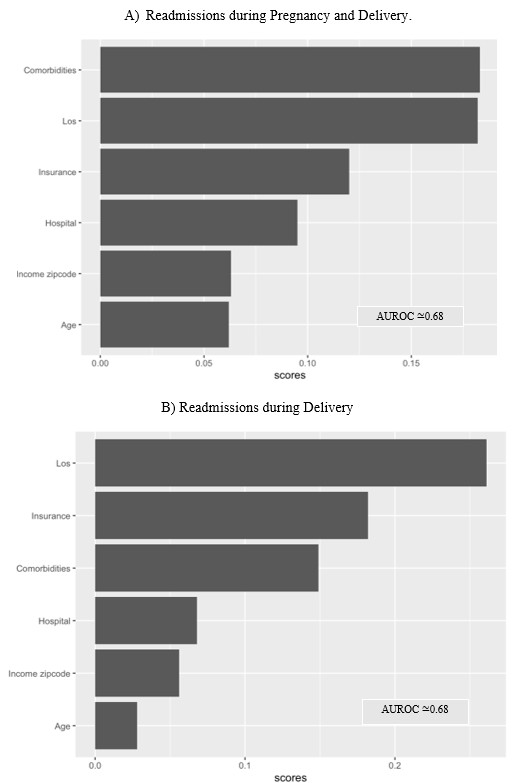Session Information
Date: Tuesday, October 28, 2025
Title: Abstracts: Reproductive Issues in Rheumatic Disorders (2627–2632)
Session Type: Abstract Session
Session Time: 3:30PM-3:45PM
Background/Purpose: Social Determinants of Health (SDOH) are increasingly recognized as significant contributors to adverse outcomes in pregnant patients with SLE. This study aims to evaluate the impact of SDOH on 30-day readmissions during pregnancy- and delivery-related hospitalizations in SLE patients, hypothesizing that incorporating SDOH into predictive models will enhance understanding of readmission risks and outcomes.
Methods: We conducted a retrospective analysis using the National Readmissions Database (NRD) from 2011 to 2021, which covers 28 states and represents 60% of U.S. hospitalizations. We identified adult pregnant patients with SLE using ICD-9 and 10 codes and categorized them into pregnancy- and delivery-related hospitalizations, including delivery cases within the pregnancy cohort. Our primary outcome was 30-day all-cause readmissions, and secondary outcomes included length of stay(LOS) and total hospitalization charges(THC). The SDOH evaluated in the study consists of income by zip code and insurance type. Descriptive analyses compared age, SDOH, clinical factors, LOS, and THC between initial hospitalizations and 30-day readmissions. We employed an Explainable Boosting Machine (EBM) model, using a 70-30 train-test split to predict readmissions based on features including comorbidities and SDOH. Weighted Mean absolute scores were aggregated globally to measure variable importance.
Results: Among pregnancy- and delivery-related hospitalizations, 3.6% resulted in readmissions, while 2.2% of delivery-related hospitalizations led to readmissions. Patients in the lowest income quartile (0–25th percentile) faced nearly double the readmission rates compared to the highest quartile (36% vs. 16% for pregnancy and delivery; 35% vs. 15% for delivery-related hospitalizations). Similarly, patients with public insurance (Medicare/Medicaid) were more likely to be readmitted, while those with private insurance/self-pay were less likely, underscoring systemic inequities (Table).SLE patients with thrombocytopenia (8.6% vs. 6.2%), hypertension (11% vs. 3.8%), pre-eclampsia/eclampsia (19% vs. 15%), or Acute kidney injury (6.4% vs. 1.7%) during pregnancy and those with pre-eclampsia/eclampsia (24% vs. 15%), renal failure (19% vs. 9.5%), pulmonary edema (3.9% vs. 1.1%), sepsis (3.6% vs. 1.1%), or thromboembolism (4.9% vs. 2.9%) during delivery had higher 30-day readmission rates[p value < 0.05].Importance analysis (AUROC ≃0.68) identified LOS, insurance type, comorbidities, hospital characteristics, income, and age as key predictors for pregnancy and delivery-related readmissions, with LOS and insurance showing the highest predictive value. Comorbidities, LOS, insurance, hospital characteristics, income, and age were top predictors for delivery-related admissions.
Conclusion: SDOH are an important predictor of readmissions in SLE patients during pregnancy and delivery. Targeted strategies focusing on improving access to resources and healthcare and addressing income disparities within disadvantaged communities may help reduce readmission rates and improve outcomes for this high-risk group.Acknowledgements: K23 Grant Award Number – 1K23AR082991-01A1
 Table : A Comparative Analysis of Demographics and Social Determinants of Health for Pregnant Patients with Systemic Lupus Erythematosus during Initial Hospitalizations and 30-Day Readmissions.
Table : A Comparative Analysis of Demographics and Social Determinants of Health for Pregnant Patients with Systemic Lupus Erythematosus during Initial Hospitalizations and 30-Day Readmissions.
.jpg) Figure: Feature Importance Scores for predicting 30-Day Readmissions in SLE patients during pregnancy and delivery-related hospitalizations.
Figure: Feature Importance Scores for predicting 30-Day Readmissions in SLE patients during pregnancy and delivery-related hospitalizations.
To cite this abstract in AMA style:
Kannayiram S, Wu Y, Sammaritano L, Lockshin M, Caruana R, Branch W, Salmon J, Mehta B. Predictors of 30-day Readmissions in Pregnant Patients with Systemic Lupus Erythematosus: The Impact of Social Determinants of Health. [abstract]. Arthritis Rheumatol. 2025; 77 (suppl 9). https://acrabstracts.org/abstract/predictors-of-30-day-readmissions-in-pregnant-patients-with-systemic-lupus-erythematosus-the-impact-of-social-determinants-of-health/. Accessed .« Back to ACR Convergence 2025
ACR Meeting Abstracts - https://acrabstracts.org/abstract/predictors-of-30-day-readmissions-in-pregnant-patients-with-systemic-lupus-erythematosus-the-impact-of-social-determinants-of-health/
